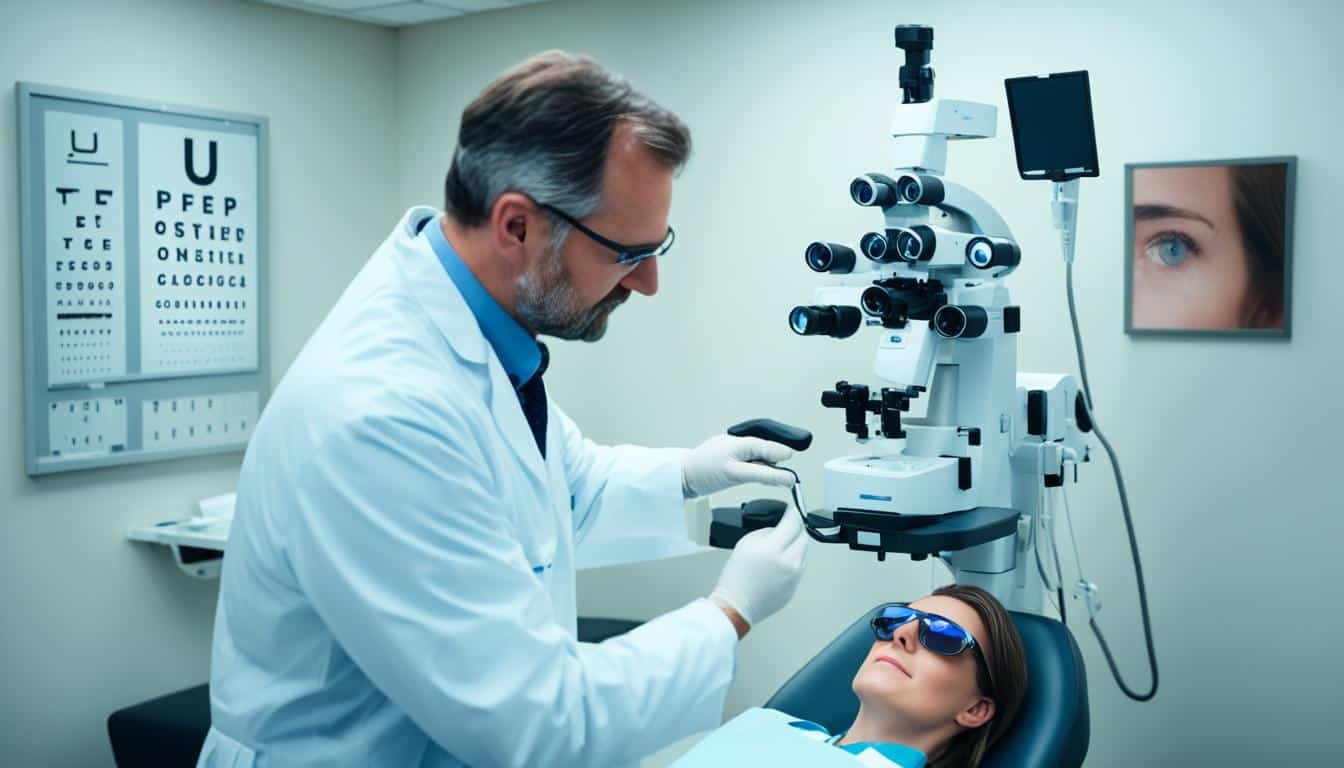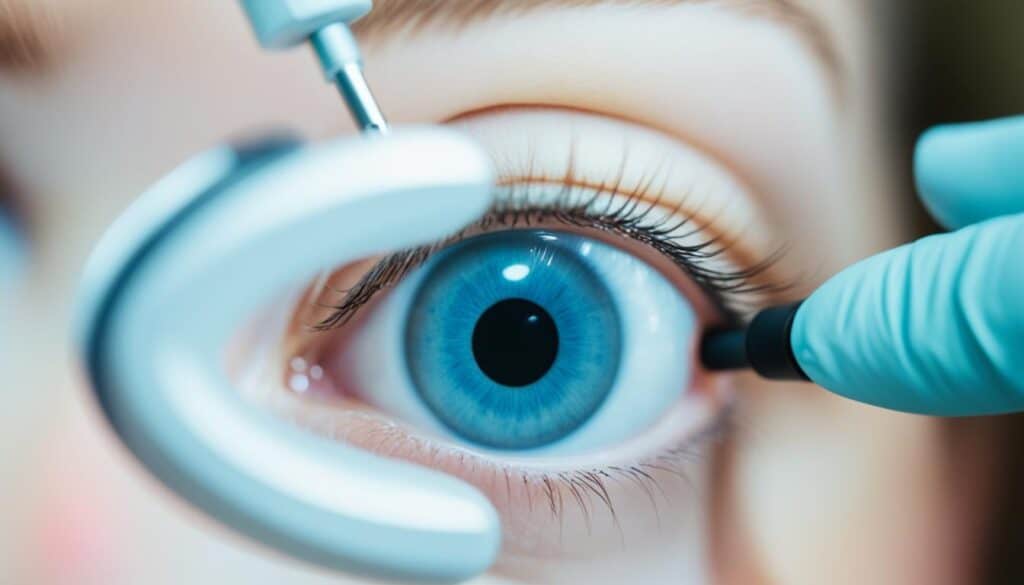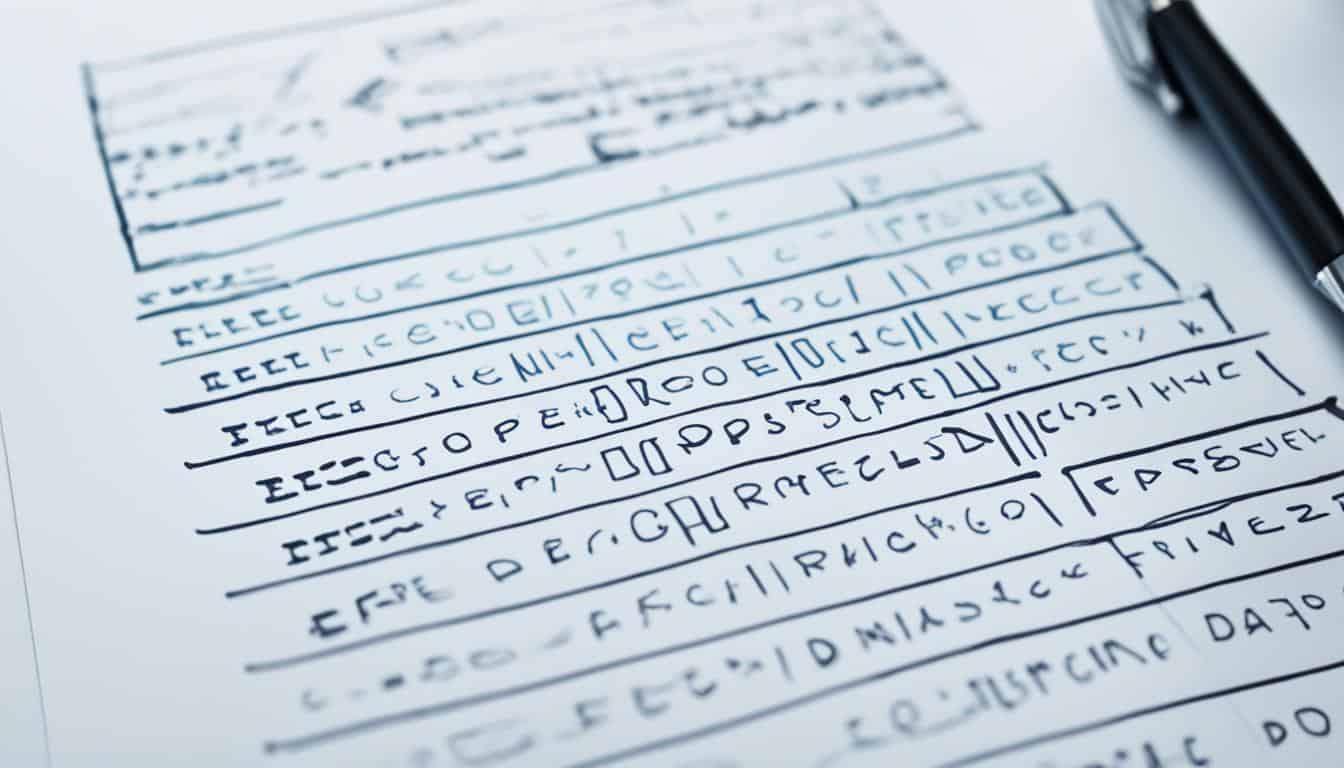Your eye health is very important. Going to an ophthalmologist regularly helps keep your vision clear and catches problems early. A full eye examination checks more than just how well you see. It looks at your overall health of your eyes.
Your ophthalmologist will do different tests during your visit. These tests check various parts of your eyes. They help spot issues like nearsightedness or farsightedness. They also catch serious problems that might not have symptoms yet.

Knowing what happens during an eye examination can make you feel more at ease. From simple tests to advanced ones, each step helps your eye doctor understand your ocular health fully.
Key Takeaways
- Regular eye exams are essential for maintaining good eye health
- Ophthalmologists perform comprehensive evaluations beyond vision checks
- Eye exams can detect both common and serious eye conditions
- Various tests are conducted to assess different aspects of eye health
- Understanding the exam process can help reduce anxiety about appointments
Understanding the Role of an Ophthalmologist
An ophthalmologist is a special eye doctor. They are key to keeping your eyes healthy. They can handle a lot of eye issues, from simple to complex.
Difference between an ophthalmologist and optometrist
Ophthalmologists and optometrists both focus on eye health. But they do different things:
| Ophthalmologist | Optometrist |
|---|---|
| Medical doctor (MD) specializing in eye care | Doctor of Optometry (OD) |
| Can perform eye surgery | Cannot perform eye surgery |
| Treats all eye diseases | Treats some eye diseases |
| Prescribes all types of medications | Limited prescription authority |
Specialized areas in ophthalmology
Ophthalmology has many special areas, like:
- Cornea and external disease
- Glaucoma
- Neuro-ophthalmology
- Pediatric ophthalmology
- Retina and vitreous
When to see an ophthalmologist
You should see an ophthalmologist for:
- Annual eye exams, especially if you're over 40
- Complex eye problems or sudden vision changes
- Eye injuries or infections
- Managing chronic eye conditions
Regular visits to an eye doctor are important. They help keep your vision clear and catch problems early.
Preparing for Your Eye Exam
Getting ready for your eye exam is key. A bit of prep makes your visit smoother and more effective. Start by collecting your medical history, especially any eye health issues you've faced. Also, bring your current glasses or contacts.
Make a note of any eye problems you're facing. Are you having trouble seeing at night? Do your eyes feel dry? Write these down to talk about with your ophthalmologist. Also, list any medications you're taking. Some can affect your eyes.
Don't forget to bring your insurance details. This makes the payment process easier. If you're unsure about your vision coverage, call your provider before you go.
“Being prepared for your eye exam ensures you get the most out of your visit. It's about your health, after all.”
Here's a handy checklist to help you prepare:
- Gather your medical and eye health history
- Bring your current glasses or contacts
- List any eye concerns or symptoms
- Write down your medications
- Have your insurance information ready
| Item | Why It's Important |
|---|---|
| Medical History | Helps doctor understand your overall health |
| Eye Health History | Provides insight into potential eye issues |
| Current Eyewear | Allows for comparison with new prescription |
| List of Concerns | Ensures all your eye issues are addressed |
By following these steps, you'll be ready for your eye exam. This prep helps your ophthalmologist give you the best care for your eyes.
Initial Steps of Your Appointment
Your ophthalmologist appointment begins with key steps to check your eye health. These steps help your doctor understand your vision needs. They also help create a care plan just for you.
Reviewing Your Medical History
First, your doctor will look over your medical history. This includes your family's eye health, current medicines, and past surgeries. Make sure to share details about your overall health too. Some health issues can impact your eyes.
Discussing Current Eye Concerns
Then, you'll talk about any vision issues you're facing. This could be blurry vision, eye strain, or sensitivity to light. Your ophthalmologist wants to know about it. This info helps guide the exam and possible treatments.
Checking Your Visual Acuity
The visual acuity test is a key part of your eye exam. You'll read from an eye chart to see how well you can see at different distances. This test shows if you need glasses or if your prescription needs updating.
In the visual acuity test, you'll cover one eye and read the smallest line of letters you can see on the chart. Your doctor will note your results and do the same for your other eye. This simple test gives important insights into your eye health and vision quality.
What Happens at an Ophthalmologist Appointment
At your ophthalmologist visit, you'll go through tests to check your eye health and vision. These exams spot potential problems. They also help figure out if you need glasses or contact lenses.
Visual Field Test
This test looks at your vision range. You'll stare straight ahead as lights flash around you. You'll press a button when you see the lights, mapping out your vision area.
Refraction Assessment
Your doctor will do a refraction test to see if you need vision help. You'll look through a device with various lenses at an eye chart. This finds the perfect prescription for glasses or contact lenses.
Eye Muscle Balance Evaluation
Your ophthalmologist will check how your eyes work together. They might ask you to follow an object with your eyes or cover one eye. These tests see how well your eyes coordinate.
| Test | Purpose | What to Expect |
|---|---|---|
| Visual Field Test | Assess range of vision | Click button when seeing peripheral lights |
| Refraction Assessment | Determine need for vision correction | Read chart through different lenses |
| Eye Muscle Balance Evaluation | Check eye muscle coordination | Follow objects, cover one eye |
These tests give important info about your eye health and vision needs. Your ophthalmologist will use the results to suggest the best treatments or corrective actions.
Comprehensive Eye Examination Procedures
Your ophthalmologist will perform several tests during a standard ophthalmic exam. These tests performed during a comprehensive eye exam help check your eye health and spot problems early.
The slit lamp examination is a key part of the exam. It's a microscope with a bright light that lets your doctor see your eye closely. They look at your cornea, iris, and lens for any issues.
Measuring eye pressure is also important. Your doctor might use tonometry, which is a quick puff of air on your eye. This test looks for glaucoma, a condition that can harm your optic nerve.
“Regular eye exams are essential for maintaining good vision and overall eye health.”
Here's a breakdown of common eye examination procedures:
| Procedure | Purpose | What to Expect |
|---|---|---|
| Slit Lamp Exam | Examine eye structures | Bright light shined into eyes |
| Tonometry | Measure eye pressure | Puff of air or gentle touch on eye |
| Visual Field Test | Check peripheral vision | Identify lights in your side vision |
| Dilated Eye Exam | Examine retina and optic nerve | Pupils enlarged with eye drops |
These procedures give your eye doctor a full picture of your eye health. They're key for finding conditions like glaucoma early and keeping your eyes healthy.
The Importance of Pupil Dilation
Pupil dilation is key during your eye exam. It lets your doctor see inside your eye clearly.
Why Your Pupils Are Dilated
Your ophthalmologist uses eye drops to make your pupils bigger. This brings in more light, helping to see the retina and optic nerve better. It's vital for finding problems at the back of the eye that might be missed otherwise.

What to Expect During Dilation
It takes 15-30 minutes for the eye drops to work fully. You'll wait in a dim room during this time. Your vision might get blurry, and you'll feel more sensitive to light.
The exam is painless but might feel a bit like gentle pressure. Your doctor is just checking your eyes.
Post-Dilation Care
The effects of dilation last 4-6 hours. Your eyes will be sensitive to light during this time. Wear sunglasses after your appointment to protect them.
Avoid driving if you can, as your vision might be blurry. It's smart to have someone with you or make other arrangements for getting home.
- Wear sunglasses outdoors
- Avoid reading or close-up work
- Skip screen time if possible
- Rest your eyes
Pupil dilation is crucial for a complete eye exam. It helps your doctor find problems early. This keeps your retina and optic nerve healthy.
Advanced Diagnostic Tests You May Encounter
Your eye exam might include advanced tests to check your eye health. These tests help detect issues early and guide treatment plans.
One common test is optical coherence tomography (OCT). This device called an OCT scanner takes detailed images of your retina and optic nerve. It helps spot problems like macular degeneration or glaucoma.
Another test you might have is fluorescein angiography. This checks the blood vessels in your retina. The doctor injects a special dye into your arm. Then, they take pictures as the dye flows through your eye's blood vessels.
Your doctor may also perform a visual field test. This checks your peripheral vision and can detect issues like glaucoma or neurological problems.
| Test Name | What It Examines | Purpose |
|---|---|---|
| OCT | Retina and optic nerve | Detect macular degeneration, glaucoma |
| Fluorescein Angiography | Blood vessels in retina | Identify circulation problems, leaks |
| Visual Field Test | Peripheral vision | Detect glaucoma, neurological issues |
These tests are painless and quick. They give your eye doctor valuable info about your eye health. Remember, early detection is key in treating many eye conditions.
Discussing Your Eye Exam Results
After your eye exam, your ophthalmologist will go over the results with you. This is a key moment to grasp your vision and eye health status.
Understanding Your Prescription
Your eye prescription is a vital part of the exam results. It shows if you need glasses or contact lenses for better vision. The numbers in your prescription tell how much correction you need. A negative number means you're nearsighted, and a positive number means you're farsighted.

Treatment Options and Recommendations
Your doctor might suggest different treatments for eye issues based on your exam. These can be simple like eye drops or more complex like eye surgery. For dry eyes, they might suggest special eye drops. If you have cataracts, surgery could be an option.
Follow-up Care Instructions
Your ophthalmologist will give you instructions for follow-up care. This includes:
- When to schedule your next eye exam
- How to care for your glasses or contact lenses
- Steps to maintain good vision and eye health
- Warning signs to watch for that might require immediate attention
| Eye Condition | Recommended Follow-up |
|---|---|
| Healthy Eyes | Annual check-up |
| Glaucoma | Every 3-6 months |
| Diabetes-related eye issues | Every 6 months |
Regular eye exams are crucial for good vision and early detection of eye conditions. Follow your doctor's advice to keep your eyes healthy for the future.
Common Eye Conditions Detected During Exams
Eye exams can spot many eye diseases and conditions that might affect your vision. Catching these early is crucial for preventing vision loss and keeping your eyes healthy. Here are some common eye issues your ophthalmologist might find:
Glaucoma is a serious eye disease that harms the optic nerve. It often shows no symptoms, so regular check-ups are key. High blood pressure can also hurt your eyes, causing retinal damage over time.
Cataracts, which cloud the eye's lens, can be found during an exam. They develop slowly, making your vision blurry over time.
- Age-related macular degeneration (AMD)
- Diabetic retinopathy
- Dry eye syndrome
- Refractive errors (nearsightedness, farsightedness, astigmatism)
Your ophthalmologist will look at risk factors for eye problems, like family history, age, and lifestyle. They might suggest more frequent exams if you have diabetes, high blood pressure, or a family history of eye disease.
“Regular eye exams are your first line of defense against vision-threatening conditions. Don't wait for symptoms to appear – schedule your check-up today.”
Many eye conditions can be treated if caught early. By being proactive about your eye health, you can keep your vision safe for the future.
The Importance of Regular Eye Check-ups
Regular eye check-ups are key for keeping your vision sharp and your eyes healthy. The American Academy of Ophthalmology suggests getting a routine eye exam every 1 to 2 years for most adults. This helps catch problems early and keeps your eyes in great shape.
Recommended frequency of eye exams
The need for eye exams can change with age and health. Here's a simple guide:
| Age Group | Recommended Frequency |
|---|---|
| 20-39 years | Every 2-4 years |
| 40-54 years | Every 2-3 years |
| 55-64 years | Every 1-2 years |
| 65+ years | Annually |
Risk factors for frequent eye exams
Some folks might need more eye exams because of certain risks. These include:
- Family history of eye diseases
- Diabetes or high blood pressure
- Previous eye injuries or surgeries
- Certain medications
Benefits of early detection and treatment
Regular eye check-ups bring many benefits. They help spot eye problems early, often before you notice them. Catching issues early can stop vision loss and keep your eyes healthy. Your eye doctor can also update your glasses or contacts for the best vision.
Your eyes are very important. Don't wait for problems to happen. Book your eye exam now and look after your eye health.
Conclusion
Your eye health is crucial, and regular eye exams are key to keeping your vision clear. Knowing what happens during an eye check-up can make you feel more comfortable and ready for your next visit. Vision tests are important for finding eye problems early, so they can be treated quickly.
Choosing between an ophthalmologist or an optometrist, the main aim is to keep your eyes healthy. These professionals use different tools and methods to check your vision and eye health. They do everything from simple sight tests to detailed tests to make sure your eyes work well.
Don't wait for eye problems to show up before getting an eye exam. Regular check-ups can spot issues early, keeping your vision good for a long time. Take control of your eye health today by setting up an appointment with a trusted eye care expert near you.
FAQs
Q: Who is an ophthalmologist and why should I see one?
A: An ophthalmologist is a medical doctor who specializes in eye care. You should see one for routine eye exams, vision problems, or any eye-related concerns.
Q: What happens during a comprehensive eye exam?
A: During a comprehensive eye exam, the eye doctor will test your vision, examine the parts of your eye including the front and back, and may use drops to dilate your pupils for a more thorough evaluation.
Q: Do I need to prepare for my first eye exam?
A: You don't need to do anything special to prepare for your first eye exam. Just make sure to bring any glasses or contact lenses you currently wear.
Q: Will I need someone to drive me home after my eye dilation?
A: After receiving eye drops to dilate your pupils, your vision may be blurry and you may be sensitive to light. It's recommended to have someone drive you home if necessary.
Q: How often should I have an eye exam?
A: It is recommended to have a comprehensive eye exam at least once a year, especially if you wear glasses or contacts, or if you have a history of eye problems.
Q: What tests are performed during an eye exam?
A: Tests like measuring your eyes, checking for color vision, and using drops to dilate your pupils are common procedures during an eye exam to assess your eye health.
Q: What can I expect during my visit to the eye doctor?
A: During your visit, the eye doctor will also discuss any concerns you have about your eye and vision health, and may recommend treatment options or further tests if needed.

